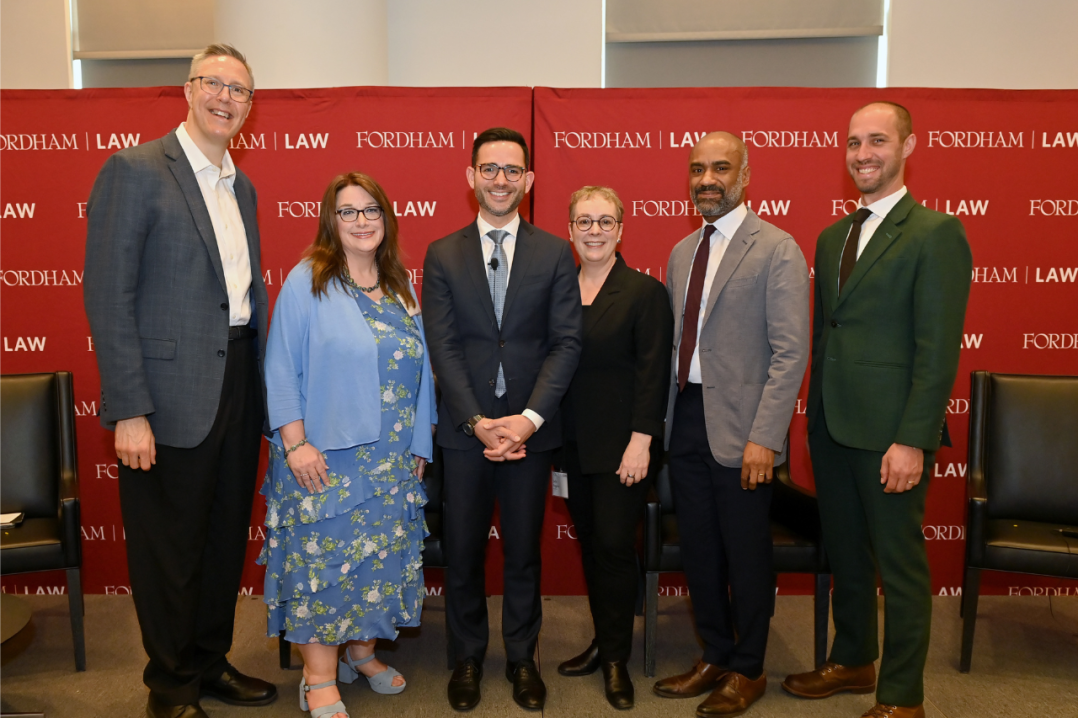While years of relatively unchecked commercial data collection has led to a moment of real despair about the state of our internet and the digital economy, there is now momentum to protect consumer privacy through regulatory action and legislation.
That was the assessment of Samuel Levine, director of the Bureau of Consumer Protection at the Federal Trade Commission (FTC), who weighed in on the future of consumer protection and privacy as AI transforms the marketplace.
Levine, along with a panel of privacy experts, spoke at Fordham Law School in mid-April as part of the fourth annual Reidenberg lecture, which honors the legacy of Prof. Joel Reidenberg, a pioneering information law scholar and founder of the Fordham Center on Law and Information Policy (CLIP).
Levine began the discussion about current challenges and the role of regulators on an optimistic note, stating, “I believe our digital economy can get better. Not because our tech giants will voluntarily change their ways or because markets will magically fix themselves. But because at long last, there is momentum across the government—state and federal, Republicans and Democrats—to push back against unchecked surveillance.”
Levine compared the current digital economy with the years after the 2000 dot-com crash when regulators and lawmakers took a hands-off approach to the burgeoning commercial internet. That lack of action resulted in the “notice and choice” regime that left consumers largely responsible for understanding privacy policies and making choices to protect their own information.
In contrast, he applauded recent momentum in the U.S. Congress and state legislatures to pass privacy laws. He also pointed to a number of FTC actions to curb data sharing and misleading corporate practices. “We are no longer just watching and waiting,” he said.
For example, Levine mentioned recent FTC orders prohibiting data brokers from selling sensitive location data as well as its enforcement action against Amazon and top executives over “dark patterns,” alleged manipulative practices to coerce consumers to enroll in or auto-renew Prime subscriptions.
With the emergence of generative AI, Levine said that the FTC is taking a proactive approach to consumer safeguards. “We’re not going to repeat the 2000s,” he said.

(L-R) Frank Pasquale, Samantha Vaughan ’96, Samuel Levine, Julia Angwin, Fordham Law Professor Olivier Sylvain, and Luke Herrine
Following Levine’s keynote, a panel discussed “The Promise and Limits of Consumer Protection for AI and Commercial Surveillance.” Moderated by Fordham Law Professor Olivier Sylvain, the panel included journalist and author Julia Angwin, University of Alabama School of Law Professor Luke Herrine, Cornell Tech and Cornell Law School Professor of Law Frank Pasquale, and Verisk’s Chief Privacy Officer Samantha Vaughan ’96.
The panelists discussed a number of the themes from Levine’s keynote, including the proper role of the FTC and other regulators to control unfair and misleading practices as well as the evolution of notice and consent and the limitations on its effectiveness. Herrine noted that the FTC’s approach was developing well before the current internet era. “The general thought of the Federal Trade Commission starting in the 1980s in particular, was that the role of regulation and especially consumer protection regulation was to make people be able to make their own choices in the market and let the market sort out the outcomes,” he said.
However, it has now become clear that consumers are largely unable to make these choices, according to Angwin, who recalled her experience attempting to control her data as a Wall Street Journal reporter and author of the 2014 book Dragnet Nation: A Quest for Privacy, Security and Freedom in a World of Relentless Surveillance, including using burner phones and aliases. “It was an exercise in futility, not a problem you can solve individually,” she said. “It’s just not possible for us to do it alone.”
“Data subjects can’t manage this on their own,” added Pasquale. “They need leadership at agencies like the FTC and the use of runaway data can be stopped. We don’t just have to resign ourselves to the information landscape that is completely uncontrolled.” Calling for increased safeguards, particularly over health information, he also noted that consumer privacy concerns are amplified in light of the use of machine learning tools.
“Across industries we’re seeing a shift from primary reliance on notice and choice as the bedrock privacy principles or fault regime to an increased focus on accountability, with particular emphasis on implementing verifiable governance,” noted Vaughan.

The late Professor Joel Reidenberg
In addition to sharing her views on consumer protection, Vaughan reflected on her time as a student at Fordham Law and her experience working with Reidenberg, who was her professor. She recalled how his classes met in a computer lab because “Joel wanted us to experience the internet in a tangible way.”
As the conversation over the privacy landscape evolves, Vaughan said Reidenberg’s collaborative approach can continue to serve as an example. “We will continue to work together with Joel’s thought leadership to guide us professionally and inspire us personally,” she concluded. “His memory is a blessing and an inspiration and may it long continue to be so.”



